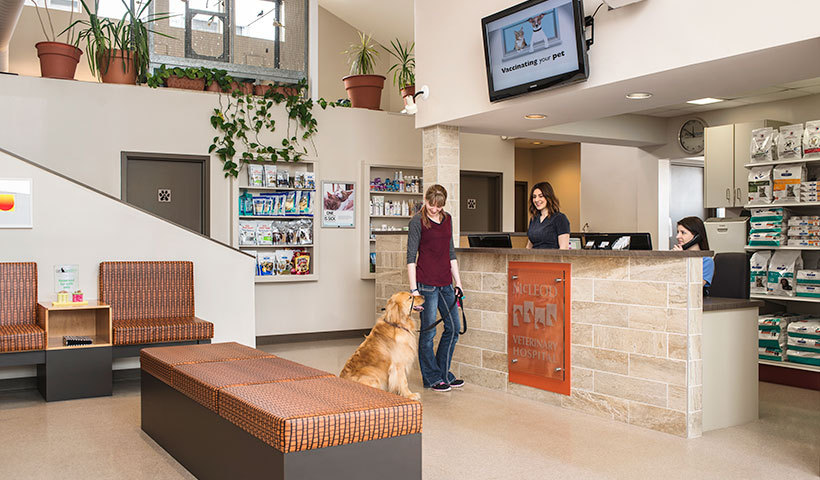Monday - Thursday
7:45 am to 6:30 pm
Friday
7:45 am to 6:00 pm
Saturday
8:00 am to 2:00 pm
Email Mcleod Veterinary Hospital
Like us on Facebook
Read reviews or write your own of
your experience at McLeod Vet Hospital.
LOCATION & HOURS
SEND US AN EMAIL
SPREAD THE WORD
 Visit McLeod Veterinary Hospital webstore by clicking here!
Visit McLeod Veterinary Hospital webstore by clicking here!
• Our webstore offers 5% discount on auto-ship pet food orders with brands Hills, Royal Canin and Purina.
• You can find all your pet supplies here at competitive pricing.
Welcome
 to McLeod Veterinary Hospital. McLeod Veterinary Hospital was established in 1982, in Winnipeg Manitoba, by Dr. Bob Newfield. Since that time, our facility has been continually evolving to provide you with the most up to date equipment and techniques. Dr. Bob has since retired, and Dr. Alison Bowles and Dr. Jason Kellsey have assumed ownership of the hospital. The purpose of this website is to enable our clients to familiarize themselves with our services and policies. Our mission at McLeod Veterinary Hospital is to provide the best possible health care in a professional and compassionate manner.
to McLeod Veterinary Hospital. McLeod Veterinary Hospital was established in 1982, in Winnipeg Manitoba, by Dr. Bob Newfield. Since that time, our facility has been continually evolving to provide you with the most up to date equipment and techniques. Dr. Bob has since retired, and Dr. Alison Bowles and Dr. Jason Kellsey have assumed ownership of the hospital. The purpose of this website is to enable our clients to familiarize themselves with our services and policies. Our mission at McLeod Veterinary Hospital is to provide the best possible health care in a professional and compassionate manner.
What's New?
Protecting your dog from heartworm and Lyme disease
During spring and summer months in Manitoba we see a resurgence of pesky mosquitos and wood ticks. Both of these bloodsucking critters spread very harmful diseases to our pets.
Heartworm: Heartworm is a parasite that is spread by mosquitos. Infected animals may not immediately show any clinical signs but, as the burden of adult worms become more severe, the signs become apparent. Symptoms include exercise intolerance, weight loss, coughing, fainting, progressing to congestive heart failure and eventually death, if left untreated.
Outdoor cats can also be susceptible to heartworm. Their immune system, however, is more effective at killing this parasite all on its own (similarly to us humans). Monthly prevention is also available to outdoor cats to protect them during mosquito season.
Lyme Disease: Lyme disease is caused by bacteria that are transmitted by the Deer tick, while they’re feeding off their host. Not all dogs that are exposed to the bacterium will develop the disease or display signs of the disease. Signs of Lyme disease are lameness, swollen and sore joints, fever and loss of appetite. If your dog becomes infected with this disease and is diagnosed early; the prognosis is good for a full recovery after a course of antibiotics. If left untreated, some dogs may become very ill and can die from this disease. Unfortunately, the prevalence of Lyme Disease continues to increase throughout southern Manitoba, including Winnipeg. Years ago, it was isolated to the southeastern corner of our province, but that is no longer the case.
Prevention is the best protection! During the summer months chewable tablets can kill these nuisance pests that cause these devasting diseases. All dogs should be on a monthly Heartworm prevention, as all dogs are exposed to mosquitos. These heartworm preventatives kill the immature life stage of the heartworm parasite. They’re administered from early June to November. Wood ticks often prefer cooler temperatures and inhabit grassy areas. We recommend a preventative that offers protection against heartworm and kills wood ticks (and fleas), to all dogs that explore such areas. This monthly prevention is administered from April to November. Annual vaccines are also very effective and best when used in combination with monthly oral chews.
We recommend routine blood testing to ensure quick diagnosis and treatment. McLeod Veterinary Hospital recommends testing in spring every second year for all dogs that are on routine heartworm and tick prevention. For dogs that are at higher risk of tick exposure, such as hunting dogs and cottage goers, we often consider annual testing, as early detection is so vital to successful treatment.
Canadian Animal Blood Bank
Did you know that there is a blood bank for dogs?...
McLeod Veterinary Hospital hosts blood donor clinics routinely, to support the Canadian Animal Blood Bank (CABB). This organization provides blood to veterinary hospitals across Canada for pets that need a blood (or blood product) transfusion.
CABB relies on people and their pets to help those that are in need. Here’s some information about donating blood.
Donor criteria:
- Weigh 55 lbs or more
- 1-8 years of age
- Current with vaccines (or have their titres checked)
- On heartworm prevention (they also recommend tick prevention)
- Healthy and have a very calm temperament when visiting the vet’s office
Dogs are placed on their side (in a laying position) on a table and a small area of fur is shaved from their neck. A Registered Veterinary Technologist (RVT), collects the blood from the dog’s jugular vein and it takes about 5 minutes for the desired sample.
Visit CABB website for more information: www.canadiananimalbloodbank.ca
if you’re a current client and you’re interested in registering your pet as a blood donor dog, just click the purple, [SEND US AN EMAIL] button to let us know.
Did you know that we work closely with Manitoba Mutts Dogs Rescue?
The Manitoba Mutts Dog Rescue (MMDR) works to rescue cats and dogs from various situations and environments and place them in loving homes. We provide some of these pets with their initial intake exam, spaying and neutering, and in some cases more complex treatments when needed.
They’re often looking for volunteer foster families, or donations.
Visit manitobamutts.org for more information or to support this great rescue organization.

